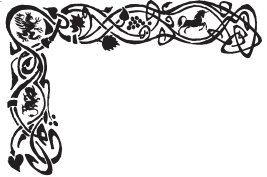Traditional musicals are quintessentially American odes to people and land. Wide open spaces serve as the basic backdrop to the high-octane dance moves of Doris Day in Calamity Jane, or the farce-ridden matrimonial hi-jinks of Seven Brides for Seven Brothers. It’s all very jolly and rip-roaring, but behind it is the serene majesty and death-dealing harshness of the landscape. Nature is intrinsically contradictory and so inspires a freedom of expression that is immune to logical oversight.
This is the Wild West. A “natural” society inspires the same animal freedom of expression. The contradictions in Rome are laid bare by the scene from Tros of Samothrace where the aspirational courtier Helene is exposed by Tros
She poised a wine-cup as if taking aim. She pointed one hand at Tros’s eyes. Her own eyes glared. “Are you a pauper? Is your wealth gone?”.. Artificiality was stripped off. Her nature was more naked than her body had been when she fought the gladiator. She was a human cobra – honestly venomous – openly baffled and angry and revengeful. (page 903)
Tros has discovered she is a slave and threatens to whip her
The slave found taking liberties with freedom could be sure of nothing less than scourging – would be lucky if not crucified – lashed to a gibbet, that is, and mocked by other slaves as death came slowly of thirst and flies and gangrene. Helene grovelled.
To us this is a pagan abhorrence, but death comes to all and Rome is true to nature to a fault. It’s fearful and terrible and stench-laden but has a certain rough honesty. The Circus is a slaughterhouse watched over by the semi-divine Vestal, but do we not have slaughterhouses? Humans are meat like animals. You can decry the cruelty but not the honesty.
What we have are souls and a rousting spirit, and no amount of bloodshed can quell those. Rome lays bare the contradictions at the heart of nature that a logical order has no conception of. The divine on one side; the grossly material on the other. Man is both and so is nature. According to a logical order we are only grossly material – like a bloody Roman Circus. Rome is honest, we cloak it in lies of deceitful “perfection” that does not exist. A convincing rightness that does without the dark side of nature – the blood and slaughter that nevertheless exist out of sight.
Death comes to all, and that is the deceptiveness of a logical order that pretends life is the only reality, mere existence, a half-reality. Roman brutality has the shock of truth
“You might appeal then to the Vestals (Nepos said). They might dare to protect you; but if they should look away I would have to order out the masks and hooks..”(the men in masks who came out to kill the wounded before other men put hooks under their armpits and dragged them out) (page 911)
The cycle of life that Man is part of, as the hunter rather than the hunted carcass

© BWS
The labyrinthine ways of the eternal city are well-caught by the fact that no one –Caesar, Pompey, Vestals – necessarily knows what’s going on
Pompey had begun to pave the way for a public protest against the Vestals’ alleged intriguing on behalf of Caesar. Their palace was heavily guarded. Even when the Vestals went to change the watch over the undying flame they walked between two lines of armed men.. (page 912)
The Vestals are the divine order that cannot be overruled – though even they must tread lightly – and so an irrational female element sanctifies the city’s government.
As I said of Clair Noto and CL Moore (HB17) the feeling is that the mystery makes the whole thing – the city – work and last. Governing Rome is an intricate balancing act and no one is immune from a swift bringing to earth (see Praetorian Guard Alternates Outtake). The city in all its fantastic contradictions – its irrational being – is bigger than anything else, and this makes it ungovernable by modern standards (where things have to be similar – see passim).
However, it is governable by the standards and disciplines of rugged nature: hunter and hunted. The bloody spectacle of the Circus is ugliness personified and, to a seaborn warrior like Tros, a sign of Rome’s decadence
I know the virtue of a fight.. For I have fought against beats and men, the elements, mutinous crew, treachery, and my own ill-humour. If wisdom, aye, and cunning, aye, or a moderate measure of yielding what is mine cannot preserve me from a fight, then let my enemy look to his guard.. But I rate an animal more highly than the man who gluts his eyes on cruelty, feeding his own foulness with the sight of boughten slaughter.. (page 926)
Sometimes, even when facing death, one has to laugh: there is a sort of fascinating absurdity in the sight of the VVM sitting to the right of Pompey, with her handmaidens in protective attendance, while the sands below are bathed in human blood-sacrifice to the sound of roars, both beast and human. The sheer absurdity of it is well-caught in Tros’s jocular
Conops came on deck to watch the triremes rolling, locked together, sinking. “Arrows?” he suggested.. “Let be!” Tros answered. “Spare them for the sake of Nepos and the Vestal Virgins!” For awhile he laughed at the absurdity of coupling the Roman headsman with the Vestals in one category.. (page 953)
I can see a resemblance between that with Howard’s heroes. The gusto of laughing at fate and the despicable practices of civilization while rolling with the seas and events (I guess in Tros the sensibility is more Homeric). Yes, but in Hyborian or in Romanic times the warrior ethic wasn’t crushed by civilization; Rome was a force of nature every bit as barbaric as her enemies. We live in a convincing reality that denies nature’s dark side, and call it civilization. I don’t agree; I think it’s anti-civilization. Greece, Rome and the Holy Roman Empire were civilized. We are robots; artificial lifeforms.
I think what Howard was talking about was the nastiness of civilization – which is fair enough. Rome was nastier than her enemies. Our societies have lost their contradictory elements and so are expressively moribund. Hunting is restricted; death and bloodshed are kept out of sight; our connection with nature is completely superficial.
“Mr and Mrs Andrews” (Hyborian Bridge 15) have that old-time sense of ease that comes of being at home with the primitive forces. They have breeding and are primitive, so there are contradictions there. That is a “natural” social order. The fact that civilization can be cruel or unjust is a given; nevertheless, it is as natural as a hawk or a wolf.
We live unsurrounded by the squawks of birds and surrounded by the pitiful bleating of Coldplay and the like. We are led to think anything convincing is right when it’s the exact opposite. Nature, as I’ve been saying for awhile, is quite difficult to get a track on; the squawks of birds don’t tell you a hell of a lot except that there is a type of eagerness and collective identity there.
So it was with Rome. Without spirit we are nothing. A logical order has to convince us otherwise – which is why it’s convincing! Has it never struck you that the neverending treadmill of the media is there so we do not pay attention to bird sounds or the wind sighing in treetops?
SWEET SEPTEMBER MORNING
The bigger picture I want to paint is that Hyborian kingdoms are unmanageable by modern standards – as is Rome. The city-state in its physical and psychic reality is a mess of contradictions, Neapolitan, you could say, dingy, sleazy, decadent but also heroic and grandiose. This reminds me of Liza Minnelli’s quote (CH5) – the seedy, decadent side of things is what gives life its zest in the midst of NY city (the Lyceum).
In Hyboria or Rome that side of things is much more honest. The city-elders build the monuments and the dingy alleyways slink around them. The divine order (or hypocritical priests) sanctifies it. It’s Neapolitan and gloomy and zestful. The animal spirit is alive and well. Freedom of expression and looseness are the order of the day.
The modern world goes contrary to that by building sameness within a logical order; a parallel reality where all the ancient symmetries have gone; mere existence or a half-life, where fact becomes fiction. We’re convinced by all these facts which is the exact sign of a false reality. It does away with contradictions so that we hardly know if we are alive or dead. The ancient labyrinth of uncertain design is no longer visible around us. Everything is certain and therefore convincingly right. It just happens to be horribly wrong, like the underground town of Topeka in A Boy and his Dog (The False Apollo)
As Harlan Ellison has said, the inviolate writer creates stories, but I think there is a way in which two independent forces can create something incomparable. Such was the Hyrkanian war (or war of the Tarim) from Conan #s 19-25. Roy Thomas gives a very good indication of how he and BWS worked
If Barry wanted to do something a certain way, I would have needed a very good reason to have said no and risk dampening his enthusiasm. That’s the way I believed – and still believe – in editing comics..So when Barry wanted to have Conan turn his head and have a spear cut his nose in #19, that was okay with me.. I’d go along with it and merge my own flights of fancy with whatever he might suggest as possible dialogue or captions. (Conan Chronicles #3 Afterword)
Thomas has a very good facility for embellishing mythoi and made-up the entire religio-culture of the Hyrkanian deity the Tarim from just an idle word in Howard’s mythos (reply to email). Meanwhile, BWS’s great facility is to be left to his own devices and invent telling sequences that can be made to flow with the narrative.
This is the Marvel Method at its best; two independent voices both working to their strengths. It is a classical undertaking because both are very free and easy; the looseness and on-the-trotism are very visible on the page, no over-strenuous rendering on the dynamics – the very opposite (superior to Red Nails Part 1 IMO. Old-time critic and classical scholar John Clifton has a thing about this – Weird 8 - as far as BWS’s later Conan Saga stuff goes, even with all the rendering I reckon he just about pulls it off!)
However, it’s the combination of Thomas’s riffing on the Hyborian mythos with BWS’s flowing dynamism and art-deco detail that give the Hyrkanian war a sense of presence in time that has never been equalled. Action-in-the-moment cannot be studied by a rule-based system (prev.) or, at least, only if it is a ballet as here. As I’ve been attempting to elucidate for awhile now, the proportionate grace of head and body in concert is the secret of ancient societies that we have lost to a rule-based order.
One can accept civilization as nasty but, as Lovecraft said of Howard, he “traduces Rome”. What Mundy brought is a sense of labyrinthine life in all its vileness and grandeur, and it does occur to me that this is what the comics – at their best – bring to Hyboria. The War of the Tarim is fabulous at weaving strands round and about the barbaric action, so to that extent adds to the mythos.
In Hyborian city-states the head is always subservient to natural forces, as we see in #19 when Conan encounters the Turanian wooden mascot, the holy Tarim.
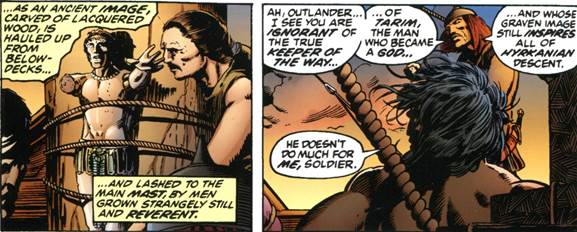
© Conan Properties
The Turanian collective belief in the Tarim propels them into the conflict under prince Yezdigerd, headstrong son of king Yildez. Conan and Fafnir are picked up at sea by Yezdigerd’s flagship, and so join forces with the Turanian fleet in the intitial landing at Makkalet, obviously as unbelievers or infidels.
One has to set-aside these collective beliefs (no different from the Middle Ages, east or west) from the wizards found in Hyborian kingdoms. Here, one Kharam Akkad, has initiated the capture of the holy Tarim – for his own nefarious and unknown reasons – virtually over the careworn head of king Eannatum. The king and his lovely young bride, Melissandra, are beloved of the populace but in thrall to Kharam Akkad’s sorcery, to repel Turanian maritime supremacy.
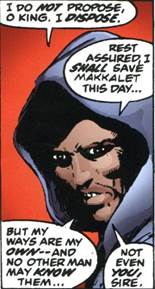
© Conan Properties
In Hyborian folklore, wizards are the implacably ego-centric powers, ever-seeking to indoctrinate and enslave ancient kingdoms to their nefarious aims (that are always hidden).
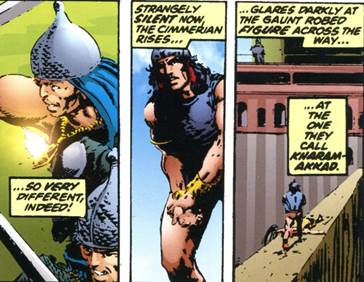
© Conan Properties
Basically, the equivalent of our own Richard Dawkins, genie of the gene. As I tend to reiterate, genes are half of reality (and therefore a lie); the other is allure, proportionate grace, symmetry and asymmetry, broken rhythm (see Bruce Lee CH9). Action, in other words. Action-in-the-moment cannot be studied except as a ballet.
A city-state is a really excellent example of this. There are always two things going on, and they are always disparate. There are the monumental edifices that are raised by the city-elders, towering statements glorious to behold. BWS’s significant achievement is in capturing the alluring power and symmetry of Makkalet seen from the galleys of the Turanian fleet.
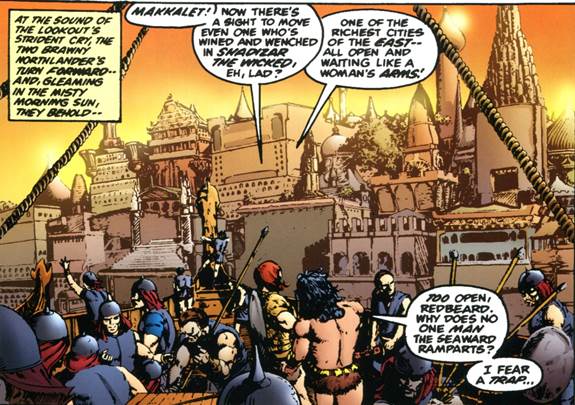
© Conan Properties
What he doesn’t depict – but what we can infer – are the arches and lanes and wending ways that meander round and about the established monuments. That is the image we often have of Hyborian cities, no different to the Middle Ages. There are two different things going on at one time, one is planned, the other unplanned, in two different universes.
Exactly the same applied to Rome: there was always grandiose planning of stadia and temples and atriums, and alongside that, a maze of unplanned alleyways and crooked streets, where obviously people mill around in unplanned fashion. This is action-in-the-moment, which cannot be studied by a rule-based system (except as a ballet).
That’s why we, in the modern world, are living in half of reality; the planned half. DNA is a good symbol of this. Half of something is always a lie, so we are living a lie. This serves the nefarious aims of our presentday wizards or egoslime. According to them, they can run things with ever-more precision, and the reality they give us of Amazon Houses and DNA-editing etc. is highly convincing, razor-sharp in clarity.
Exactly, because you’re basically looking at the sun. The sun is a million-fold more convincing than the moon. What’s missing is action-in-the-moment and therefore athletic grace, proportionality of head to body, balance and mystique. Mystique is the exact opposite of clarity; Conan can’t get his head round it though it means life and death and war to the Turanian followers of the Tarim mascot
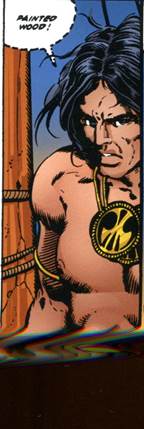
© Conan Properties
All our leaders, with a few exceptions, obey the precepts of our modernday wizards for the reason that they have a high opinion of their heads. It’s an ego-trap of facts that provide us with a convincing future society; a half-reality with no grace, no allure, no mystique. A parallel reality of straight lines, solar-powered and safe, a half-life, not so different to one’s fate in a Roman Circus.
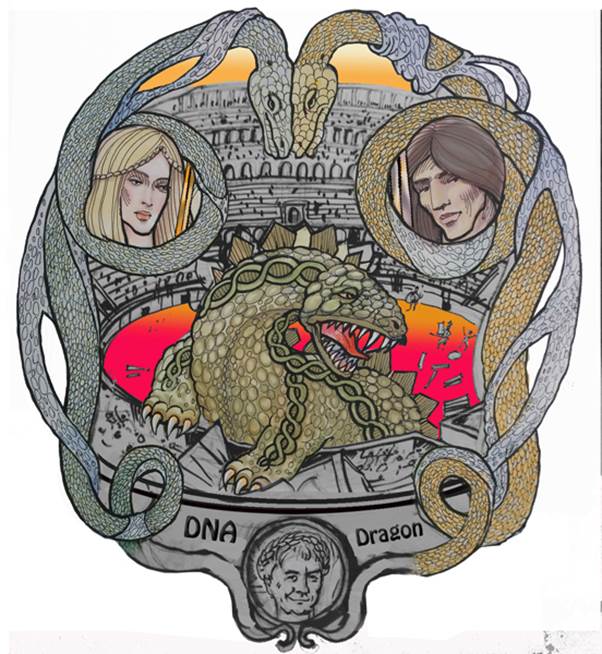
Sketch by Elena for finished painting “DNA Dragon”
Home
